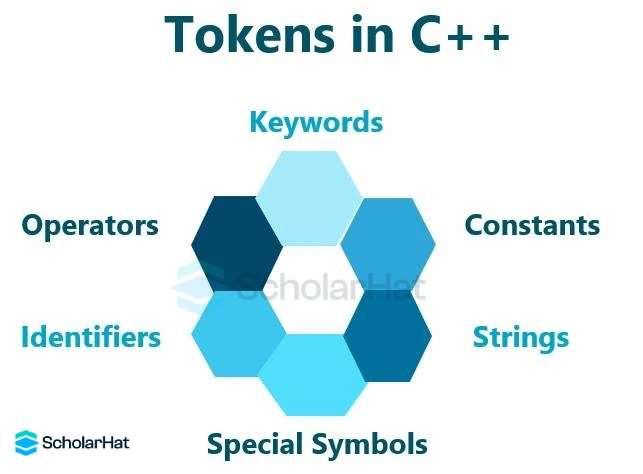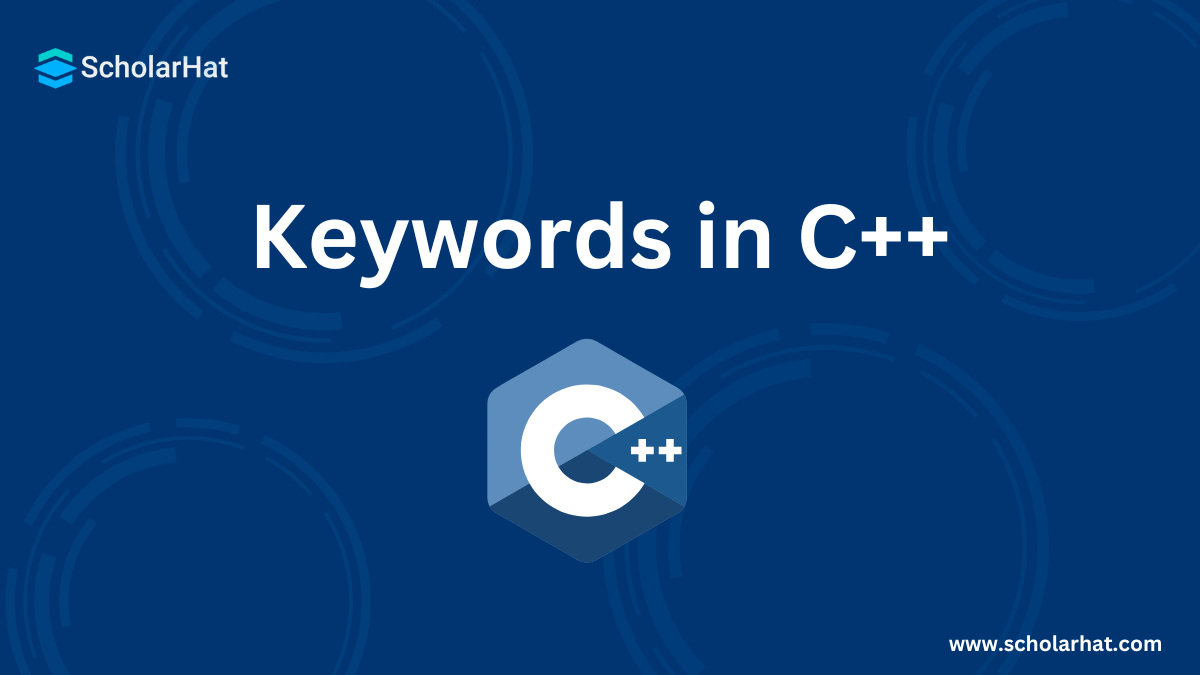05
JanWhat are Keywords in C++ | List of all keywords in C++ ( Full Explanation )
Keywords in C++: An Overview
Keywords are reserved terms in the C++ programming language that have preset meanings. These words cannot be used as identifiers (for example, variable names) yet are critical to program structure and functionality. e.g. "int," "if," "while," and "class." They are essential building blocks for writing code, aiding in the definition of data types, control flow, and object-oriented notions. In this C++ tutorial, we will understand what are tokens and keywords.
Tokens in C++
Tokens, the smallest individual unit, comprises a C++ program. Tokens can be keywords, identifiers, constants, operators, or punctuation marks, among other things.
Tokens in C++ are classified into six types:
- Keywords
- Identifiers
- Constants
- Strings
- Special symbols
- Operators

Read More - C++ Interview Interview Questions and Answers
What is a Keyword in C++?
Keywords or reserved words convey a specific meaning to the compiler of C++ programs and it is always written in lower cases. Keywords in C++ language are generally used for serving some special functions such as void, int, publicand many more.
Types of keywords in C++
If the question is how many keywords are in C++ then the answer will be, that C++ language has 32 various types of keywords.
C++ Keywords
| asm | double | new | switch |
| auto | else | operator | template |
| break | enum | private | this |
| case | extern | protected | throw |
| catch | float | public | try |
| char | for | register | typedef |
| class | friend | return | union |
| const | goto | short | unsigned |
| continue | if | signed | virtual |
| default | inline | sizeof | void |
| delete | int | static | volatile |
| do | long | struct | while |
Explanation of Keywords in C++
- Asm: It is used to declare a block of code that has to be passed to the assembler.
- auto: This keyword is a storage class specifier that is used for defining objects in a particular block.
- break: This statement terminates any switch statement or any loop.
- case: This keyword is used specifically within a switch statement to specify a match for the expression of the statement.
- catch: It specifies which actions have to be taken when an exception occurs.
- char: This is one of the fundamental data types in C++ language that defines character objects.
- class: It is used to declare a user-defined data type that encapsulates any data members and operations or member functions of a particular class.
- const: This keyword helps to define objects whose value will not alter throughout the lifetime of execution of that particular program.
- continue: It transfers control to the starting point of a loop.
- default: This keyword handles expression values in a switch statement that could not be handled by case.
- delete: It is a memory deallocation operator.
- do: indicate the start of a do-while statement in which the sub-statement is executed repeatedly until the value of the expression is logical-false.
- double: Fundamental data type used to define a floating-point number.
- else: Used specifically in an if-else statement.
- enum: To declare a user-defined enumeration data type.
- extern: An identifier specified as an extern has an external linkage to the block.
- float: Fundamental data type used to define a floating-point number.
- for: Indicates the start of a statement to achieve repetitive control.
- friend: A class or operation whose implementation can access the private data members of a class.
- long: A data type modifier that defines a 32-bit int or an extended double.
- new: Memory allocation operator.
- operator: Overloads a C++ operator with a new declaration.
- private: Declares class members who are not visible outside the class.
- protected: Declares class members who are private except to derived classes
- public: Declares class members who are visible outside the class.
- register:A storage class specifier that is an auto specifier, but which also indicates to the compiler that an object will be frequently used and should therefore be kept in a register.
- goto: This keyword helps to transfer the power of the control to a specified label.
- if: It indicates the starting point of an if statement to achieve selective control.
- inline: A function specifier that indicates to the compiler that inline substitution of the function body is to be preferred to the usual function call implementation.
- int: fundamental data type used to define integer objects.
- return: Returns an object to a function’s caller.
- short: A data type modifier that defines a 16-bit int number.
- signed: A data type modifier that indicates an object’s sign is to be stored in the high-order bit.
- sizeof: Returns the size of an object in bytes.
- static: The lifetime of an object-defined static exists throughout the lifetime of program execution.
- struct: To declare new types that encapsulate both data and member functions.
- switch: This keyword is used in the switch statement.
- template: parameterized or generic type.
- this: A class pointer points to an object or instance of the class.
- throw: Generate an exception.
- try: Indicates the start of a block of exception handlers.
- typedef: Synonym for another integral or user-defined type.
- union: Similar to a structure, struct, in that it can hold different types of data, but a union can hold only one of its members at a given time.
- unsigned: A data type modifier that indicates the high-order bit is to be used for an object.
- virtual: A function specifier that declares a member function of a class that will be redefined by a derived class.
- void: This keyword identifies the absence of a type or function parameter list.
- volatile: This particular keyword defines an object that may vary in value in a way that is undetectable to the compiler.
- while: This keyword helps to start a while statement and end a do...whileloop.
FAQs
1. What are the keywords of C++?
Keywords in C++ are reserved words with specified definitions, such as "if" and "class."
2. How keywords are different from identifiers?
Identifiers are user-defined names for variables, functions, and other things while keywords have predetermined meanings and cannot be used as variable names.
3. How many keywords are there in C++?
32 keywords are available in C++, including "int," "for," "while," and "return."
Summary
In conclusion, C++ keywords are essential language constructs with established meanings. They are essential for program structuring and flow control. In C++ programming, each of the 32 various sorts of keywords, such as "if," "class," and "return," serves a unique purpose. Understanding these keywords is critical for error-free coding. Furthermore, tokens include different aspects of C++ code such as keywords, identifiers, constants, strings, special symbols, & operators, making them the core of C++ programs.




